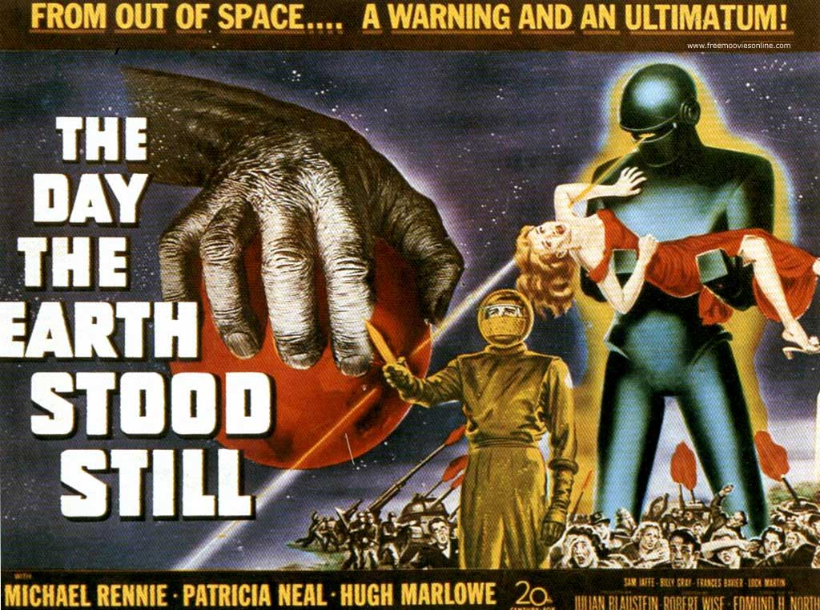
The Year the Earth Stood Still
“Citizens of earth, we come in peace”
Any fan of 1950s sci-fi movies will recognize these immortal words as coming from the alien invader in the pioneering 1951 film The Day the Earth Stood Still. Spoken in perfect English by a well-mannered, handsome alien, these words have become used to the point of cliché in the sci-fi world.
The basic premise is that our well-meaning neighbors the Martians have come for a visit to warn mankind of the existential dangers of nuclear weapons proliferation — to ourselves, to our planetary neighbors including the Martians, and beyond. To demonstrate the seriousness of their mission, and to get the earthlings’ attention, the Martians shut down all of the electrical grids of Earth for one day. Drained of power, life essentially stops — the Earth literally stands still. This demonstration of unprecedented power is enough (in this quaintly optimistic fiction) to swerve the people of earth away from their dangerous path.
Bombs away
Boomers will remember nuclear war as the defining fear of our youth. We had drills in grade school about how to protect ourselves when the bombs started falling — basically, cover your eyes from the blinding flash and get under your desk to minimize the damage from the school’s roof collapsing over you. Far from being of any practical use, or even making us feel temporarily better, these exercises gave me nightmares — especially in October 1962 when the Cuban Missile Crisis put us literally at the doorstep of a nuclear exchange with the Soviet Union. (Funny, but I don’t recall having drills at that unique time — maybe it was all too scarily real for such “survival theater.”)
The threat of nuclear war remains today as serious as then, if not more so — though we as a society don’t seem to worry about it so much anymore. We have moved on to new things to worry about!
Our viral invaders
We are now living through the days the earth is seeming to stand still — and there may be many more of them. Instead of of being suave, cool Martians, our invaders are teeny tiny viruses — small enough that millions of them could fit on your fingertip — and are glad to do so, if you give them half a chance.
Are these viruses “talking” to us? Do they enlighten us in any way about our life on earth? Are there lessons we can, and should, be taking away?
Lessons learned?
I think there are, and that we will all emerge from this stronger and wiser IF we can learn from these lessons. I offer this starter set, in no particular order:
- We are all in this together. This phrase has become so clichéd because it is so true. This virus does not care if you are rich or poor, black or white, red or blue, American or Chinese — it is an equal-opportunity threat.
- We are stronger together than apart. There are some amazing stories of scientific knowledge exchanges and crowd-sourcing in areas related to possible treatments, potential cures, testable vaccines, etc. On the other hand, nationalistic trade and foreign policies simply have no place in the 21st century global village in which we all live.
- Who controls the data, controls the future. Areas that tested more widely early (South Korea, Taiwan, Hong Kong, and Shanghai, for example) had much lower rates of infection and death than those that did not (Italy, for example).
- Actions speak louder than words. The costs of not acting in time have become clear. Simply appointing committees and talking on TV has no effect on this virus.
- Hope for the best, but plan for the worst. Hope is not a plan, and optimism is not a strategy. Even planning doesn’t really work, since you can never predict exactly what might happen. But there is no reason for, or excuse for, being caught totally unprepared.
- Our world is fragile. Many of the little pleasures of life that we take for granted are really just “on loan” to us — and can be taken away in an instant.
My hope is that when the dust settles — as previous experience with disasters has taught me it will — we will not only not forget these lessons, but that we will keep them top of mind as we move ahead, renewed and inspired, toward the future.
I recently found this unpublished item I had drafted in late March 2020, as the full impact of the global pandemic was beginning to emerge. Having gotten my second vaccine shot on March 11, 2021 — the first anniversary of the WHO’s official pandemic declaration — it finally seemed fitting to publish it.
Colleagues have since chided me for my unbounded and unwarranted optimism. In fact, the USA seems to be “celebrating” our release from Covid-mania by, among other things, resuming our previously-unbroken string of mass shootings.
Comments RSS Feed